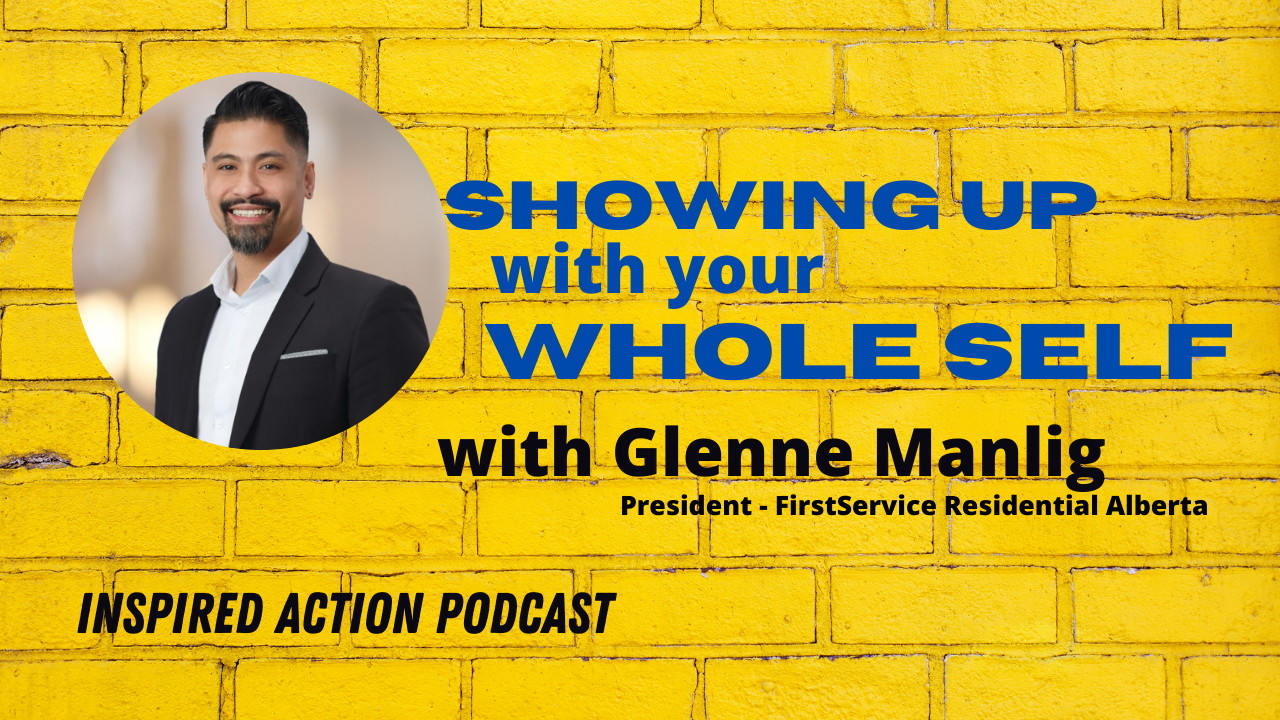“Showing Up With Your WHOLESELF” Brief Summary:
Do you show up with your WHOLESELF in the workplace? Or do you check your emotions at the door? In this Inspired Action For Imperfect Humans podcast episode Host Kyle Kalloo discusses with Glenne Manlig, President of FirstService Residential, how showing up with your whole self, and not checking your emotions at the door can lead to a better workplace, taking a me environment, to a WE environment.
“Being a leader is not about how you can take whatever thing it is that you’re doing to the finish line. It’s how you can empower everybody else to support that cause and get us to the finish line.”
Summary:
- Glenne shares his story of how he got into property management
- The journey into leadership.
- Do leaders fail?
- Glenne discusses his definition of success.
- Bringing your whole selves to work and being vulnerable.
- Do businesses need to foster a corporate coaching culture?
- Advice for new or aspiring leaders.
Guest Contact Info:
FirstService Residential: www.fsresidential.com/alberta
Glenne Manlig’s LinkedIn: https://www.linkedin.com/in/glennemanlig/
Glenne Manlig’s email: [email protected]
Calls to Action:
Even before the remote workforce evolution, office culture was inherently fragile. After all, it’s made up of imperfect humans interacting with other imperfect humans. And while perfection isn’t the goal, we all secretly wish for a workplace where people find ways to bring out the best in each other. Unfortunately, that’s not always an intuitive skill. It takes guidance, practice, and then more guidance and practice… but with the right leadership, it’s definitely achievable. How do you enhance your workforce’s ability to engage, collaborate, and adapt in this volatile and uncertain reality? Get the answers to your culture questions when you setup a complimentary Discovery Session with Kyle Kalloo at https://ChangeMyLifeCoaching.as.me/?appointmentType=14623413
Kyle Kalloo, ICF – PCC (Professional Certified Coach) and certified Master Coach (CTMC), to learn more on how he can help your organization create an engaged, collaborative, and adaptive culture.
Tell us your “inspired stories” stories by visiting www.InspiredActionPodcast.ca
Christopher Lawrence LinkedIn: https://www.linkedin.com/in/career-life-coach-christopher-lawrence/
Kyle Kalloo LinkedIn: https://www.linkedin.com/in/kyle-kalloo/
Change My Life Coaching & Change My Business Coaching LinkedIn: https://www.linkedin.com/company/6446498/admin/
Looking to create a corporate coaching culture? Reach out to Kyle Kalloo: [email protected]
“Showing Up With Your WHOLESELF” Transcript:
[00:00:00] Being a leader is not about how you can take whatever thing it is that you’re doing to the finish line. It’s how you can empower everybody else to support that cause and get us to the finish line. Are you experiencing lack of mentorship and might not want to ask because you don’t want to look incompetent is the thought of being imperfect, keeping you from taking action.
Welcome to inspired action for imperfect humans season three each week, we interview senior leaders to uncover the inner workings of being a strategic leader, and how, they curate a corporate coaching culture. We debunk some common misconceptions by exploring their failures and successes as imperfect humans.
This weekly mentorship will help you with tactics to play the game, navigate the politics and think strategically. From the heart of Calgary, [00:01:00] Canada. Here’s your host. Award-winning coach Kyle Kalloo. Oh my goodness. What a guy into Glenne like. It gives me goosebumps every time I hear it just about what’s out there. So everyone, before we meet Glenne, let me just do a quick little intro.
So I’m really, really, really excited to have Glenne with us today, um, for a couple of reasons. And we’re going to get into it in a moment here, but just a few things that I think a lot of people may or may not know. Cause if you’re not from that circle in property management, you may not know, but Glenne Manlig.

Is, um, the president of first service, residential Alberta, were it more than for more than 15 years of property management experience, he’s really kind of got under his belt. Glenne oversees the first service Alberta team who delivers service and solutions to more than 300 managed communities in Alberta.
And if you want to break that down, that’s over about 25,000 homes, that is a lot Glenne for you to be able to kind of stay [00:02:00] up at night. Maybe I don’t know how you sleep, but we’ll get into that, uh, Glenne’s, a servant leader with the philosophy that his purpose is to serve those he’s responsible to, or for whether it’s at, um, for the homes or professionally.
Right. As a, as a whole Glenne, um, also would tell you for those people, um, may who know him will know that he’s for his people and his teams. Right. He works for them. And it’s not the other way around, which I love, especially those who follow from a servant leadership perspective. And so I like that mindset Glenne when you kind of get into it.
And so I’m curious of all the things you could have done. Why this gig, how did that happen? Yeah. Great question, Kyle, and I guess first and foremost, You and having me on your podcast and certainly. Um, you know, it wasn’t like I, you know, went to college and said, what’s the, you know, uh, [00:03:00] uh, undergrad or, or what’s the courses that I need to take to be a property manager.
I think any of the peers that I have, uh, many of the team members that I have, I think would say the same thing, you know, we kind of just fallen into this I accident, but in that accident, I kind of look at it as, you know, things happen for a reason. You know, I came from a year where, you know, I needed to find the job and it was during that time.

Were you still find uh, employment on a newspaper. I remember that. Yeah, it wasn’t, you know, Googling this or, or, or an Indeed or LinkedIn, none of that stuff. You don’t know, you have the opportunities. And there was, um, it was a position for a resident manager role, uh, for a mid-rise building here in Calgary, it was great on paper.
Get to live for free. You get to work from home. Um, you know, at the time, you know, the, [00:04:00] the money was good for a bachelor like myself, you know? Right. Kind of downtown core of Calgary. And, uh, it kind of did all of like all of the responsibilities itself kind of fit what I did naturally take ownership. Be proud of what I do.
Talk to people be personal and serve people. So, you know, I started in this industry by accident as a resident manager for a mid rise building and ah, here I am today. Do they still do that? Cause I remember actually remember that I think growing up a buddy of mine, he was in these apartments and the, uh, I think they call them super at the time, you know?
And, uh, they were, they lived in the building and so they were, that’s where they were like, wasn’t it difficult cause they knew where you lived in, like there’s no office hours. Is there? Yeah, no, it was a 365 day job for sure. Woah. You know, it’s uh, in the role that I, [00:05:00] that I, that I filled in and yes, it still happens today.
Kyle kind of multifamily apartment space, kind of the 30 to a hundred unit. Three to five level building. So I was like, they made it easier from your day of 300. Yeah. Yeah. But they, you know, they did everything, right? Like, you wore multiple hats. Um, you were maintenance guy, you cleaned a little bit, you collected the rent. You showed the suites. Um, you were the after hours person, um, you know, you did all of that stuff.
And I think those that really have succeeded and have advanced themselves from kind of that beginning or those that really kind of value the ownership and the rewarding feeling that we’re doing, somebody, something for somebody’s most important thing, which was their home, their home. So, you know, a lot of the peers that I have that are, you know, had of kind of advanced same ways is I have, I think there is that, pride in knowing that what we do? [00:06:00] It takes cares of people’s homes. Yeah. There’s like this, it was like this end game to it. And I think that, I appreciate you saying that, you know, Glenne, cause I want to talk a little bit about that journey from that into the leaderships, as a senior leader, you are right now.
And I think a lot of times people don’t remember that we’ve started somewhere. Like it’s just, you don’t just get out of school and boom. You become the president, the CEO senior executive, right? There’s there’s usually. This path that kind of happens along the way. And I, and I think that’s when we talk about, on our podcast of inspired action for imperfect humans, is that there’s none of us.
That’s perfect. There’s no perfect line, you know, getting to where we are. And I think that’s for our listeners and people who are watching as well, just to understand a little bit about how we got there. So you did this 365, where you had to learn how to multitask, reprioritize, be everything right between the leader to doing it yourself.

And to this role, like what has that journey would you say, um, in your [00:07:00] leadership, um, has been like for you, if you could kind of summarize that. You know, um, in the beginning, you know, and I’ll even take this a little, you know, a couple of steps back prior to getting into this profession. I played competitive sports. I played competitive basketball.
Yeah. Me too. Not competitive. Yeah. No, I’m definitely not competitive anymore.
But at the time it was, you know, the leader to me was you were the best at something. You were the expert at something, you were the one that gave the instructions. And it was a lot about you, my mind, a lot about me. Um, you know, it also came from a, a cultural place and kind of a personal place in terms of how I view leadership, timeless, you know, culturally.
Larger family that I [00:08:00] have. I’m a sibling nine of us, but tenure was always important. Okay. Elder as leader. There’s a reason. Yeah. There’s a role that hierarchy based on tenure and age was, you know, kind of when I first started my journey, I said, you gotta be the best at something. You gotta be an expert and you gotta be.
So that was kind of the beginning. And as things started to progress and you start to mature and you start to experience you quickly, I quickly realized that, you know, from, uh, from being a leader is not about how you can take whatever thing it is that you’re doing to the finish line. It’s how you can empower everybody.
else. To support that cause and get us to the finish line. So it became very I to we and it also became very clear that the wisest and the smartest didn’t come from age. It came from [00:09:00] experience, and sometimes experiences outweigh the importance of each itself and vice versa. I mean, I think there’s always been a again that, um, you know, importance around, you know, the older you are, the wiser, you are the leader that you are right.
As the journey progressed, it’s been about what kind of experiences have you had. How have you learnt, how have you helped empowered others? How did you contribute and solving a problem for somebody else? How are you able to serve that person or that thing without you being in the front. Instead of leading from the back, right. Uh, Glenne, listen, I mean, I know we don’t have a lot of time and I think we said that before is that the whole concept of leadership is so much right.
That we obviously can’t, um, you know, unpack all of it. You know, you said some other stuff too. I think, you know, north Americans, they may not fully grasp, which is these cultural things, right. Things that I thought [00:10:00] was, you know, um, just our culture. Realize, It’s everyone else’s culture outside of north America, for whatever reason.
Right? And so there’s some cultural pieces because yes, your, your background, uh, plays a role into it. And so I get what you mean by that being the first son being the first grandson, there, there is a hierarchy of all these things that’s expected. And I don’t know about you, but no one sat me down and said, okay, you gotta lead
this is what it looks like. Right. And so you figure it out. And I like how you were able to make that transition between recognizing, you know, it moves from because there’s so few leaders still to this day have the mindset of 1812 that says I have to be the one to do it. I have to come up with great ideas.
I have to be the expert. And that’s actually not true in, in this kind of what you said is, is how do I move a collective group? Right to a certain vision. And so with that, there’s gotta be some failures along the way. Like if you could highlight what were some of the failures you could [00:11:00] say that you kind of figure it out or learned along lot journey.
Yeah, I got, I got two very distinct, uh, one is going to go back to kinda my, um, days of playing competitive basketball. I played college. I played university and in my mind I’m going to be a pro player. Yeah. And I’m thinking point guard. I’m thinking. Yes, point guard. Yeah, I knew you would be. I knew you’d be alright. I played for the university of Manitoba and I played for SAIT couple of years.

There you go. You know, it’s, it’s, it’s knowing that that basketball competitiveness journey was more than just the athletics. Exactly. Everything else. And so failing in, you know, completing my four year or my five-year journey with that, uh, time at unit UVM and. And I think that failure for me, allowed me to realize that there was something else out [00:12:00] there for me.
Um, and, and, and at the time, all I knew was basketball. All I envisioned it was, this is how I’m gonna pay my bills. And this is how I’m going to raise my family. And if I hadn’t failed, if I hadn’t advanced, I wouldn’t be in a position that I’ve been through. I wouldn’t have been coming off of that year, looking for that job in that newspaper, say, how can I make ends meet now.
How do I do this because I’m not playing basketball anymore. Right. Right. That journey is kind of, so, you know, I think that failure has taught me that things happen for a reason and just keep pressing, keeping yourself and, and, and know that there might be a calling out there for you that might not be the original calling that.
Aspired to originally. The second failure I wanted to just kind of mentioned professionally, and I don’t want to come across, you know, overly confident in this. Right. Haven’t had too many professional mistakes where I’ve been fired or on a performance plan or [00:13:00] any of that kind of stuff. And, and, and I think if anything, like I think about my career, I’ve advanced quite quickly, while it’s been bottoms up resident manager and property manager, operations manager, et cetera, et cetera, it’s been fairly quickly.
But what I’ve found is by not failing in those instances, I hadn’t had that experience. So when I failing now, it’s like, oh, this sucks. It hurts. And then they’re also expected and have this responsibility to lead. I’ll try and learn this new experience. So the failure for me is not failing enough. Yeah, because I was going to say to you, you, you, you got lucked out because trust me, you need a good one or two firing to get that onto your belt.
to topple you to then say, you know what? Cause there’s some there’s make no mistake. And I did this in a previous world. I was in where, you know, and I’m looking for it. Cause I’m speaking to someone from that same organization that’s going to be coming up. And before I left that, I burnt some. [00:14:00] I deliberately, I know people tell you don’t burn bridges because you never know which is for the most part.
Yes, it’s true. So please, those who are listening don’t I don’t condone it. There’s be strategic about the bridge you burn. Right. Um, but I did because I was just so fed up with the crappy leaders I was surrounded with because here’s the thing when employee starts complaining about leadership, they’re not going to say, oh, besides Kyle, everyone else is horrible.
Right. But besides they don’t say, they just say their leadership here sucks. They blame the company, right. And this, all this other stuff that goes with it. And so there are times where I know I needed to be fired out of this place. Like I know. And besides the packages a lot better when you get fired. Right.
But you know, there there’s there’s moments where you just have to, you know, it’s a good thing when you, you get fired from this company because they’re doing you a favor. And so to your other point around these things sometimes will happen for a reason. It’s sometimes it will allow you to get into that.
Uh, however, what I [00:15:00] heard from you Glen, is that you got an opportunity to learn that in your first failure side, right? As the playing competitive, doing those sports, right? Because you know, there are games, you just don’t win, right? No matter how good you were, no matter how set you guys were, no matter how organized those things will happen.

And I’m noticing a common pattern as I’m talking to a lot of these leaders here is. We seem to get up. People seem to get up and get back in line. It’s not about, oh my God, I failed. This is done you know, six feet under, let me in, you know what I mean? You actually get up and you go back into it, which is what I can really appreciate.
So I, I would say to you, the silver lining, you would say for all these failures would be, what if there was a silver lining.. Yeah. I mean, you know, the silver lining for me is that you have another opportunity. You know, you, you know that the basketball journey didn’t work out for me. I have another opportunity to find a different calling.[00:16:00]
Um, While I had left, you know, a very highly respected organization where I’ve had a mentor that I just very much respected and appreciated. I do. I had an opportunity to advance my career, you know, the silver lining and all of these lessons that these failures is that you have another chance. Right. So I think that’s a silver lining cop.
Yeah. I really liked that because isn’t that really the truth. There’s like, I, you know, I don’t know if I read that somewhere. I like to think I made it up myself, but I know I didn’t, which is, you know, an opportunity is never lost. It just goes to the next person. Right. And so what may not be your opportunity could have been someone elses.
Right. Or maybe there’s another opportunity for you elsewhere. And it’s back to that mindset that we were just kind of alluding to about, you know, we think the plan was supposed to do the following. Right. And sometimes we can’t even imagine the position we’re in. Cause you’re like, I didn’t even think about that.
Like you said earlier, I didn’t say I [00:17:00] need to go to this leadership thing and I’m going to be property management and resident, and be called on 365 days, you know, out of the year. So I really, I like that. So what would you say, Glenne, that if you had to define success and I know there’s many people out there probably are way smarter than you and I, but you know, if you had to, you know, define success, what would you say that is?
For those who are emerging leaders listening? You’re you’re, you’re already bang on. I’m not smart enough to define,
I’ll say this, I’ll say this in the past, I assess quantitatively it’s about money. The more money I made the more successful I was. You know, and you, you, you, you hear this from a lot of top, top coaches, of course. Yeah. I would say especially vacations and, and nicer clothes, the nicest, the nicer cars, and the more direct reports you have, the bigger of the P and L that you manage all of those [00:18:00] quantitative I’m successful because, you know, I can measure it in numbers.
I think now I measure success qualitatively. It’s the level of. You know, my customers, my, my, my, my, my team, more importantly my home. I’ve got three beautiful daughters and a wife that just is absolutely the rock. And I can be engaged and have a one-on-one conversation where I’m absolutely in the moment. That’s success to me.. Oh, you know, what’s great about that, Glen, so direct you on that, but you know, what’s great about that.
Your daughters and your wife I’m sure does. They do not know you’re the president,
you know, and, and, and, and being able to. Uh, feel the impact that you’ve made by just listening to understand when somebody’s going through a really rough time. Um, you know, having that impact on being able to guide or empower somebody and they’ve solved the. We’re having completed a major project and then you can just see it in their eyes, [00:19:00] how proud they are.
You know, I think I measure my success and successful, you know, generally in ways that you can qualitatively know that you’ve increased engagement and you’ve earned trust you’ve contributed and you impacted somebody’s life in a very positive. Um, so I think that’s what I would say to that, that question again, not smart enough to actually define listen, if, if being smart means, you know, it all, then I don’t want it.

Right. Because at the end of the day, you know, Uh, McDonald’s, uh, the the one, the founder, Ray Kroc often says, you know, when you’re green, you’re growing, when you’re ripe, you’ve rotten. And so my main thing is just always about how do I stay green? And I, you know, I, that really resonates with me. Been, you know, connected and it’s about engagements, you know, that’s really as the legacy right.
Of did I matter to someone’s development or, you know, [00:20:00] their contribution to the organization, to themselves, right. To their teams and to their colleagues, because that’s what you can, I would like to think wherever you go, that you could take that with you because what you can’t take. And I don’t know about you, but I’ve never
seen, you know, a, U-haul at the back of a funeral car, you know, a hearse. I’ve never seen that cause you can’t take your stuff. Right. You just have to take what you, you able to do. So what would you say is a challenge right now in your leadership? Like, as you think about, you know, were you trying to bring the organization?
Is there a challenge right now for you in leadership?. I mean, look, there’s, there’s, there’s always challenges that, that come up, whether it’s, you know, managing, you know, your customer’s expectations or managing, um, you know, your, your teams. Um, I think what continues to percolate up is maintaining the consistency of engagement, with our team.
Well a, you, you started it off at the top, you know, [00:21:00] um, our industry and property management. It’s, it’s, it’s, it’s a tough industry. It’s thankless, you know, our, our, our team members that are providing that service, you know, the other side of that is a recipient of taking care of their homes. Right. So when all you hear is complaints, that’s this mad and all of the good things that get kind of overshadowed, it takes a toll on individuals.
So being able to continue to inspire and engage and articulate to the associates, what they do matters so much is so important. So I think that’s going to be a never ending challenge. And, you know, our solution is to continue to be engaged with you to get ahead of it. Uh, you know, we, we have a philosophy.

Bring your whole selves to work, good, the bad, the indifferent.. Yeah, we do that. So that when times get tough, you establish the relationship with your peers that you can get through with anybody else. Yeah. Okay. Glenne, we did a [00:22:00] podcast on this. I actually, we had to do two. Two segments of it because it, people were really engaged on that.
And my business partner, Christopher, um, feels very passionate about this set subject. And I’m going to kind of put you on the spot a little bit by asking you your, your opinion on it. What we often hear from a lot of leaders. You know, and again, I’m going back to sometimes the mindset of 1812, and that seems to be the year I keep going back to tell you how ancient things are.
Um, but, uh, and they say, you know what? You need to check your emotions at the door. When you show up to work, you need to check your emotions at the door. Now what I’ve heard, and I’m giving you an opportunity to clarify it. What I’m hearing from you is that may not necessarily be check your emotion at the door.
It means bring it all in because you are this human right. That needs to come in. So, correct me if I’m wrong, like, what is your, do you want them to check the door? Do you want them to bring it in? Yeah, when I hear it. That phrase, I don’t take it very literal [00:23:00] it’s in my mind. You’re, you’re mindful of your emotions.
You know, you come in and you know, where your mood is, you know, you think of, um, a day where, you know, you’ve come from a very tough meeting the night before. And if you feel like you’ve left things down or let people down, you’re gonna come into the office with, you know, you’re frustrated. You’re like, oh, I just gave it to my all.
And I, I blew that, whatever it was. Right. So I don’t take it so literal, but I ask that associates, hey check your mood at that, where you at that moment. Bring your whole self and say, this is where I’m at Glen, you know, I’m impatient, I’m frustrated. Why are you frustrated? Let’s talk about it. And through that conversation, hopefully we can navigate your thought process and a little bit more of a productive state.
Within your behavior changes, your mood changes or the results, your results as a result and your results change. So I don’t take it literally that phrase and to clarify, yeah, I absolutely [00:24:00]promote encourage that everybody comes in here. Uh, and it, it starts definitely at the leaders like our leaders have to cast that shadow and show that vulnerability.
That you come in and I’m super happy. And here are the reasons why I am today. I’m, I’m upset. I’m disappointed because of this is what’s happened. Let’s work through it.. But again, the intent that, that is when really tough situations occur. Right. You got to follow it out with a guide next year. You want to do the guy that you know, that you’ve trusted and you’ve shared some vulnerabilities..
And, you know, I can go to battle with all my family members because we went, we’ve gone through hell and gone through. Yeah. You’re using an interesting word and I don’t see it a lot in leaders is vulnerability. You know what I mean, and, you know, because I think some people sometimes feel they cannot be vulnerable to their team.
Right. And I’m going to ask you a question about, you know, creating a corporate, um, uh, coaching culture in a second. And for those who are listening, I’ll do a quick definition of that in a second. Um, [00:25:00] but I think what’s happening is that. We are humans. We’re going to make mistakes. Like you, you heard already today, right?
Like you’ve said, it’s about, you know, I had failures, I’ve learned from some of those things and, you know, I’m able to still take action, which is going to that next level of what that looks like. And sometimes people need to know from an engagement perspective that you’re you’re human. Right. Um, there was a survey that came out where people and it’s it’s came, came up a lot with, um, with the pandemic where people are.
Um, I dunno, I’m putting these jobs back out and know people that we call to offer the job. I have a couple of clients where like, we’re calling them and they’re not coming back. And here’s what I’ve noticed when we go through a pandemic or, you know, something like that. Uh, you know, even a death in the family, we tend to start looking back and saying reevaluate our own life.
And some people say. Why am I going back to that deadbeat job? Why am I going back to that culture? Where am I going? And that’s really what it is. And [00:26:00] it’s always about the engagement. You know, we blame money sometimes by saying, well, they weren’t paying me good anyway. Right. But it’s really about, I didn’t feel engaged.
The, my leader didn’t respect me. You know, he’s up here, I’m down here. Right. There’s always this thing that kind of goes back. And so I’ve said to these new clients, or even prospects that said, I would say, check your culture. Like, what are you doing? You know? And so what I mean by that, for those who are listening, and I’m curious of your input on it, as well as.
More and more organizations have recognized the, the value of building a corporate culture of coaching that offers employees of all levels. Right. And that kind of what you, you mentioned already Glenne, right? And it’s not just for the executives or the managers. It’s the opportunity for everyone in the organization to grow their skills, enhance their value and reach their professional goals.
Because back in 1812, we only spent money on leaders. We only taught leaders. We only mention all these other things, [00:27:00] right. And I know you’d be surprised to hear this Glenne, a lot of the leaders I’m talking to, usually they’re telling me that the issues with their team not them, Right. The team is the issue. And it’s interesting.
When I go in, I do a facilitation with the team. They realize like, maybe I need to talk to you. I’m like interesting. Right. So, because they can only do what, like you said, it has to start at that level of the leaders are not doing it. Then what does that look like? So I’m actually curious, you know, from your perspective, what is it that you guys are doing in your organization that will help curate that corporate coaching?
Is there something that you guys do? Yeah. You know, I think, um, our, our core values and similarly to all of our, you know, uh, competitors in other industries, um, you know, they’re there, they’re there to be able to guide us in the way that we interact with service and coach every teach and all of these things.
I, what I really appreciate about FirstService [00:28:00] Residential is that our core values are very human core values, like right there in the back, our values? Yes, I like that. You have it up. We’ll have to look for it. It’s right there. I’ll name a few. Improve it. Aim high. It’s build great relationships. It’s own it. You know, you think about those things.
And I think about those things and I’m like, that’s how I want my kids to be raised. Absolutely. Want my kids to own it. Be accountable. You make a mistake own up to it and fix it, solve problem. Now I want them to continuously improve their experience, life, whatever it is, you know, I want them to aim high.
I want them to shoot for the stars. Right? So all of these things are very human and very personal. Into the corporate world. And you have a mindset of bring everything, bring your whole self that’s a recipe for engagement, because folks are going to believe that this is the stuff that I do at home. And our corporation or [00:29:00] company gives us permission to bring our whole selves.
Yes. But a leader that is vulnerable that can say, Hey, look at that leader, that leader doesn’t have to be the smartest.. He’s finding people that are smarter than him intentionally. Yeah. This is ludicrous. You know, it gives our associates that permission to say, this is genuine. This is real. This is authentic. And when times get tough, I’m going to look back at this experience and say, it’s worth it for me to continue to stay here.
Although the industry is tough. Um, so, you know, I would say our core values are very personal. They’re very human. And you mix that with, with the mindset of bringing your whole self. Okay. Top down left. Right, right. Everybody’s expected to do it. It’s not just nice fancy words on the wall, which, Hey, a lot of people have a lot of people have.
And like I [00:30:00] said, the work we do is when I say, tell me your vision. If I asked everyone in the organization, the number one priority would they know, and the moment they pause, that’s the problem. Because if someone has to fish it out, then that’s going to be a thing. Can I just, you know, it’s interesting because.
Started FirstService four years ago, I saw that I had, I was a bit skeptical, like, oh yeah, that’s great. It sounds good. And then, you know, as months went on very quickly, I’m like some of these individuals really live these values because that’s who they are as a person. And so then there was a population where you need to just allow them to realize that this is
you just gotta, you just gotta get it out. You gotta, you gotta help them cultivate that this is who you are. You just need to be able to get that permission. Um, to be genuine and that you have the value of improving it, you can aim high. Um, but it’s, it’s, it’s astonishing to [00:31:00] me because you’re absolutely right. There’s instances where there’s pretty words and, you know, great marketing behind core values and then there’s that.
And people that actually live it because that’s who they are as a person. And it’s just a matter of leadership trying to cultivate it from the rest of the folks. Yeah, cause then it comes back to that whole self that you were talking about, right. Is if it’s not about self, it’s not a part of you and it’s not really enough for you then how can I bring it?
You know what I mean? And so that’s why I really liked that piece around the whole self. Now, some leaders that are listening and just as a final question for you today, Glenne, you know, as the, you know, we talk about the emerging senior leaders, these are leaders who want to bring their game to the next level, or maybe people who
never thought of leadership and may think, you know, cause there’s some scary ones out there. Right. And, uh, you know, I know you’d be surprised to hear about this, but maybe once upon a time in my life earlier in my career, I might have been a shitty leader. I’m just going to put it out there. I might have been, I know you’re surprised.
I know you’re surprised. [00:32:00] Um, but I, that might’ve happened. And I think sometimes that’s what people are exposed to, in my opinion. Um, at least the ones I’ve been exposed to is. There’s a lot of shitty leaders out there. And so for those who are emerging leaders, who wants to get to your level, right? Want to start aspiring and plan out them for themselves?
Is there one thing that you can say I would do this right. Be mindful of this. This is what you should do day in, day out. What advice would you give that leader? And the head fake is this is the advice you would give your younger self. Yeah. Yeah, no, that’s, that’s, that’s a, that’s a fantastic question. You know, if I, if I was to say just one piece of advice, I, and I say this to my team, um, you know, relentlessly is you establish a goal, have a target.
That’s important. You want to know where you’re going. As soon as you establish that. Put all of your focus and be obsessed with the process. You [00:33:00] know, that every day there’s going to be mundane stuff, there’s going to be boring. Things that you have to do to get to that goal, but do it with intent and embrace that.
Love the boring stuff, be patient, you know that it’s going to suck, but it’s part of it. But if you have that mentality of just being obsessed with the process, the result is gonna come. Yeah, how can it not? How can it not? Right. And sometimes result is not the initial result that you wanted, but it might lead you to something it else.
Yeah. And again, it’s back to trust the process. Set a goal? Set the target? As soon as you do it, leave it alone. Yeah. Be relentless on the process, but I think sometimes, and that’s great and it’s not a, but, and I think the, the situation sometimes with that is that sometimes we get knocked off or what I say distracted, and then we no longer trust the process.
We no longer aspire to that. Right. Do you find that sometimes it’s like, something happens. You’re like, oh, I’m done. I’m out. [00:34:00] I, you give up. And you’re, you’re absolutely right. And I think, you know, part of that process, because, you know, there might be, you know, the first series of things that need to happen, but you have to have a contingency plan.
You have to have a plan B sometimes you can’t write out those contingency plans and plan B until that situation actually occurs. You have. Navigate in different ways. Um, you know, I I’ll say that the process is being disciplined. Yeah. It’s really difficult. Right. It’s knowing that this happened for a reason. Let’s look into it, let’s understand that, Hey, we’ve got to adjust here.
We’ve got to make a different move here, but continue to move forward. You might sometimes move sideways. Of course, which is okay, but just don’t backwards. Yeah, right? Like that’s, that’s the piece where then you start to say, well, screw the process the process isn’t working, but know that going sideways is better than, you know, taking that step backwards.
Yeah. I really love that. My mom used to say to me, and I, I quote my mom a lot only because, you know, you know, she thought I wasn’t listening. [00:35:00] Right. You know how that goes. Right. You know? Cause if you don’t do what she says, you’re not listening when I’m like, I heard you. It doesn’t mean I agree, but I heard you.
And one of things, she was sometimes off to say, so sometimes you make the right decision. Sometimes you have to make the decision right. I mean, So what you just mentioned about the sideways there’s times where you’re like, okay, I really thought this is, but I’m still going to decide I’m still going to keep moving.
Right. I’m still going to just keep that going. So thank you so much for that, Glenne. You know, I, you know, in summary, when I think about what we were talking about today is, you know, at the end of the day, you may be put into a situation. And what do you do with that situation? How do you make the best out of that situation, because if you’re not mindful of your whole self and how you bring it into play and how do you engage with other people, then that could be your demise, right?
And so the fact that you need to be able to show some vulnerability in your leadership to know that success is just around the corner of successes, learning from all of those little life lessons is really going to help someone be more strategic [00:36:00] in their leadership and getting them to where they need to be.
Glenne, hopefully I summarize that. Okay. Um, but thank you so much for being here. Um, and folks who are listening, if you haven’t done so already, please subscribe or download our podcast, share this with, you know, a friend, especially when you’re talking about thinking about your own leadership and mentoring, because I know for some leaders out there, you may not have the type of mentoring you wish you, you could have.
But if you want, you know, you heard from Glenne, you know, he’s all about bringing your whole self to it, which I, I, that makes sense. And there’s nothing wrong with you going back to your leader and let him know that he needs to step that up. He or she needs to step up that game because I think Glenne
and I are gonna change how leadership lead in this kind of this world, not even country in this world. Thank you so much. See you guys next week. There you have it. Thank you for listening. It’s our goal to build a global community of inspired action takers, and we can only [00:37:00] do that with your help. So if you love Inspired Action For Imperfect Humans podcast, please leave us a review on your favorite podcasting app.
Provide a rating, download, subscribe, and share us on your social. New episodes every Tuesday you’ve heard from us. Now we want to hear from you. Keep the conversation going by joining our private Facebook group Inspired Action For Imperfect Humans or go to InspiredActionPodcast.ca and tell us what is the inspired action you took this week?
Next week, on Inspired Action For Imperfect Humans. You’ll have to make some changes to that team. And to me, that’s what, you know, what leadership really is making hard decisions and, uh, and having a vision that people really want to follow.



